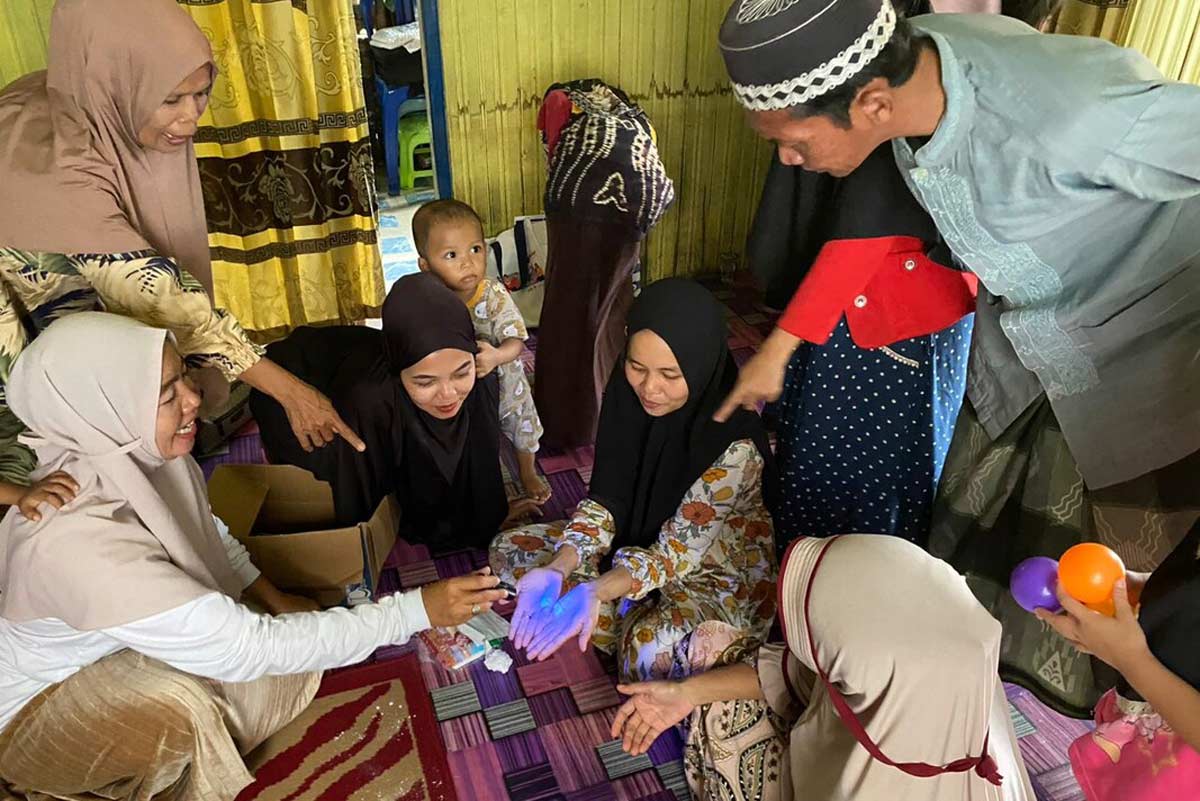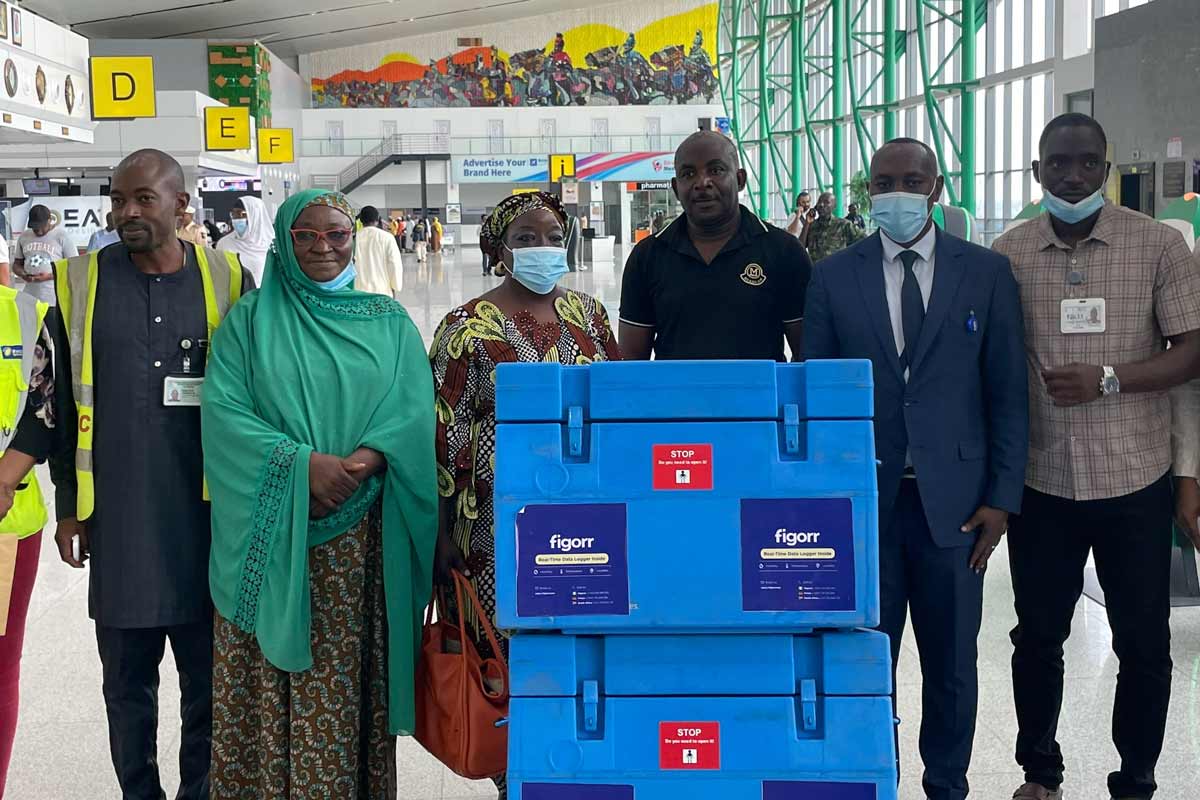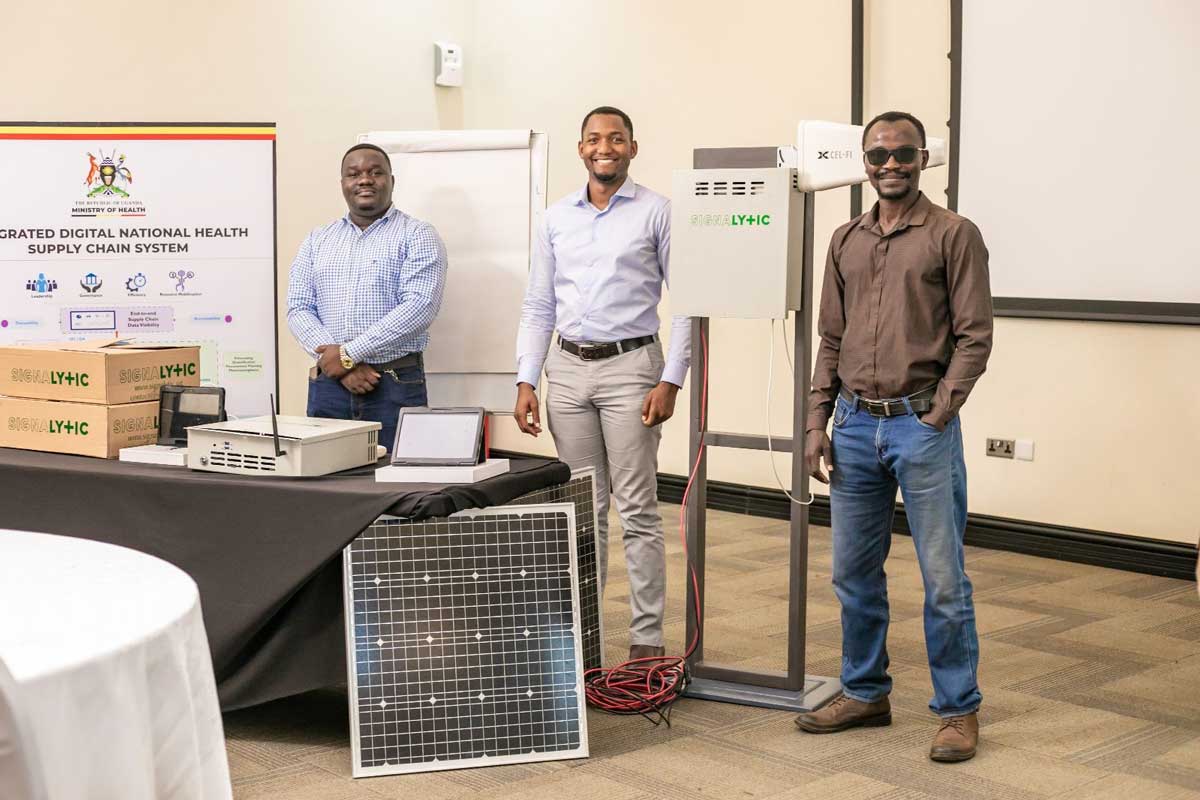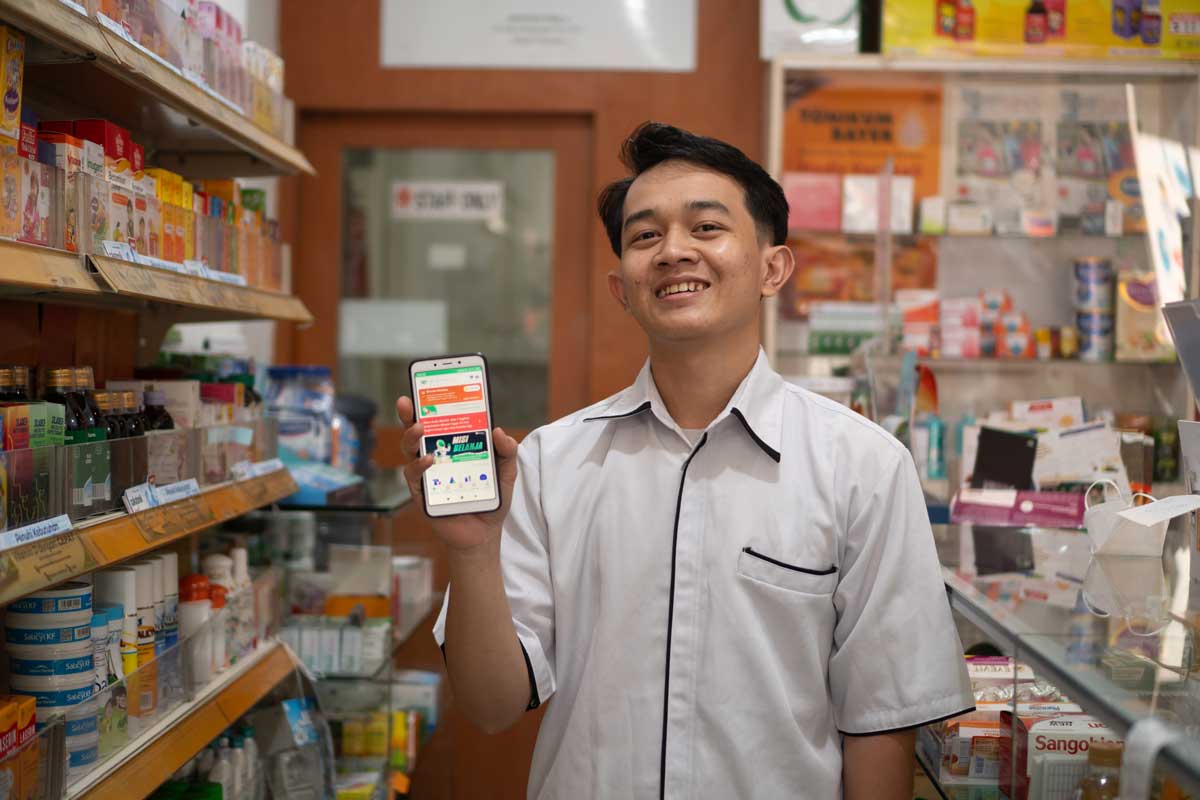Vaccines, veggies and very clean hands: in Indonesia, three interventions are combining to improve health
A new partnership in Indonesia is aiming to improve three simple ways to improve child health: vaccination, nutrition and hygiene. It’s just reported its first set of results.
- 27 November 2024
- 8 min read
- by Diane Abad-Vergara , Gavi Staff

“In the past, I was careless when washing my hands,” laughs Herawati, a young mother of three who lives on the semi-rural fringes of Bogor, a West Java city that bleeds, at its northern extent, into Indonesia’s sprawling capital Jakarta. “I never washed my hands with soap – even coming to the house from outside, I never washed my hands. I just did it when I remembered it.”
That’s changed. In Herawati’s household, soap is in. So are fresh veggies; so is vaccination. It’s actually “not that hard” to prepare healthy meals, Herawati notes with pleased surprise – and the prices for good ingredients at the local grocery stalls remain “affordable” .
Granted, getting on board with immunisation has required a little bit of expert demystification. “The first time Syakila had the injection, she had a fever,” Herawati, says, recalling her eldest’s first shot. “That worried me right? I felt nervous and scared.” But well-informed community health workers dropped by, sat down with her at home, and explained that a fever is a normal and short-lived reaction to vaccination. Nowadays, Herawati’s husband is “constantly reminding” her to check whether the kids are up to date on their jabs.
The changes Herawati’s family have ushered in during this past year may have felt like modest shifts, but zoom out to the community scale - or further, to the national level - and the evidence suggests that’s far from true. Here, as in many other pockets of this vast, heterogeneous archipelago, the deliberate cultivation of a few simple, healthy habits has the potential to make a transformational difference to the future of a new generation.
Shorting out a vicious cycle
In Indonesia, nearly 21% of children five years old or younger – about 4.5 million kids, according to the most recent data – suffer from stunting, a visible and lasting effect of malnutrition.
Malnutrition also weakens the immune system, leaving children highly vulnerable to infectious diseases that can spread like wildfire in places where the twin safety nets of immunisation and sanitation are frayed. More than one quarter of deaths in babies under the age of one in Indonesia are caused by pneumonia and diarrhoea.
But as Herawati discovered when she encountered workers from a health programme called Keluarga SIGAP – “the ready family” in Bahasa Indonesia – it’s a spiral of risk that’s reasonably simple to interrupt, and even reverse.
The idea driving Keluarga SIGAP is that you can build a holistic culture of health in families by focussing on the promotion of three very targeted behaviours: hand-washing with soap, timely and complete childhood immunisation, and better nutrition.
And the partnership behind the initiative, which includes Gavi, Unilever, Lifebuoy, The Power of Nutrition and Indonesia’s Ministry of Health, had reason to believe it would work even before the work kicked off in two pilot zones, starting in January 2024. A pioneering programme known as Safal Shuruaat, launched by Gavi, and Unilever Lifebuoy in northern India in 2016, recorded striking successes, and provided a model ready to be replicated in other countries.
New data from the Indonesian pilot confirms that the concept travels well. The project’s first major evaluation finds that in both pilot sites – Bogor Regency, on the outskirts of Jakarta, and Banjar Regency, which lies in the southern portion of Kalimantan island – Keluarga SIGAP has posted encouraging results.
Concrete impact
Though they’re very different geographies, both Banjar and Bogor shared notably high levels of stunting, diarrhoea and pneumonia, as well as suboptimal levels of immunisation coverage before the project launched. The pilot posed an implicit question: how, and how quickly, could that baseline be made to shift?
A matter of six months later, Keluarga SIGAP had trained 2,000 government health care workers in both places. Those workers, newly equipped with specially-developed educational tools, had made contact with 18,000 households like Herawati’s – families of children aged two or under .
These 18,000 interactions have encompassed home visits, community group sessions, and father-led initiatives that emphasise their nurturing roles and promote shared parenting. Local leaders, midwives, and educators have come together in meaningful discussions, amplifying community voices by in radio and television broadcasts that celebrate local contributions.
And Keluarga SIGAP has cast its net much further through digital media, reaching 15 million people on Facebook, Instagram and TikTok.
Online, users have engaged with dynamic content, featuring gamified elements such as interactive quizzes and a WhatsApp bot that encourages parents to learn and practise vital child health behaviour. Unilever’s expertise in developing digital content meant the project was able to produce enjoyable, bite-sized activities that foster collaborative learning together with the kids.
A study conducted by the Center for Tropical Medicine at Universitas Gadjah Mada and released on November 21 , tracks the concrete impact those efforts have made. The proportion of parents recognising the importance of immunisation increased from 87% to 95%, underscoring a significant behavioural shift in the community. Additionally, belief in vaccines’ ability to prevent severe diseases rose by 5%, highlighting growing awareness of their protective effects. Importantly, the number of parents tracking their child’s immunisation schedule – whether independently or with family support – increased by 21%.
There have also been improvements in nutrition. The proportion of parents believing that only breastmilk should be given to infants in the first six months, without any water or other foods, increased from 90% to 94%.
These shifts in attitude may have contributed, alongside renewed focus and investment from Indonesia’s Ministry of Health, to real improvements to child health in the pilot districts. Coverage with the PCV1 vaccine – which blocks one of the most common bacterial causes of pneumonia – has risen from 28% to 64% in the targeted communities. Regular handwashing with soap before feeding kids rose from 50% before the Keluarga SIGAP to 81% at the point of evaluation .
Health workers and village heads across both districts reported seeing an uptick in health-seeking behaviours.
“The number of parents coming to the Posyandu [community-based integrated health care centre] to immunise their children has increased,” noted Siti Nurhayati, a midwife from Dalam Pagar Ulu Village, Martapura Timur Sub-district, in Banjar. “In the past, the average number who visited was only around five parents. But now the average has reached 15 parents.”
Dr Yasna Khairina, Head of Banjar District Health Office, echoed her. “We ourselves have felt the positive impact of this programme. In the past, health workers had to work hard to convince some communities who still believed immunisation was not important because they felt that without it, children could grow and develop. But after Keluarga SIGAP, there is now an increase in the number of visits to the Posyandu for immunisation.”
Ripples
It’s too soon to say what the longer-term health consequences – on stunting and infant mortality rates, for instance – of these first-wave results will be. But in terms of behavioural change, the outward ripples of the Keluarga SIGAP intervention are already in evidence.
Not only have vaccine coverage rates increased contemporaneously with the study period, but families’ feelings about immunisation shifted as a consequence of the work: 87% percent of parents surveyed said the programme positively influenced their decision to immunise their kids. Attitude changes endure and spread. Participants have described sharing what they’ve learned with friends and extended family members.
Local leaders also report that also the training of health workers – known locally as “cadres” – has had positive knock-ons. “What is extraordinary about the Keluarga SIGAP programme is that the cadres are now given knowledge,” says Ratna Wulansari, Village Head of Kota Baru in Bogor. “They used to lack knowledge. Now they tell me that they are smart […] This makes me, as the village head, very grateful, because I cannot walk alone to work for the health of the community.”
And for some caregivers, learning healthy habits has created an appetite for more. Having participated in the full gamut of Keluarga SIGAP learning activities, mum-of-three Herawati says, “I want to gain more experience, and know more about health for my children. Because my kids are my top priority – and their health is also my number one priority.”
Have you read?
Putting expertise to work
If the new data speaks to the viability of the project’s design, it’s also a vote in favour of the partnership behind it. Keluarga SIGAP showcases how the disparate expertise of a diverse allegiance – in this case, Gavi, Unilever, The Power of Nutrition and Indonesia’s Ministry of Health – can stitch together to enhance child health in Indonesia.
Gavi’s experience in immunisation has shaped the backbone of the initiative, ensuring that strategies for increasing vaccine coverage are well-informed and targeted. Unilever has leveraged its deep understanding of behaviour change and hygiene promotion – knowledge shaped, according to Rebecca Marmot, Unilever’s Chief Sustainability Officer, by dedication to the principle that water sanitation and hygiene are a fundamental human right. Meantime, the Power of Nutrition’s speciality is the amplification of efforts to promote better nutrition practices in families, enabling parents to understand the importance of a balanced diet in their children’s growth and development.
The entire effort has slotted into the infrastructural skeleton steered by Indonesia’s Ministry of Health, and has been carried on the shoulders of a cohort of dedicated and well-informed Indonesian health workers.
As the initiative prepares to expand into Sukabumi and Brebes, the insights gained from the pilot in Bogor and Banjar will guide its approach in these new areas. Ambitiously aiming to improve the health of over one million children by end 2025, Keluarga SIGAP stands as a powerful example of how targeted partnerships can lead to meaningful change in community health across Indonesia.








